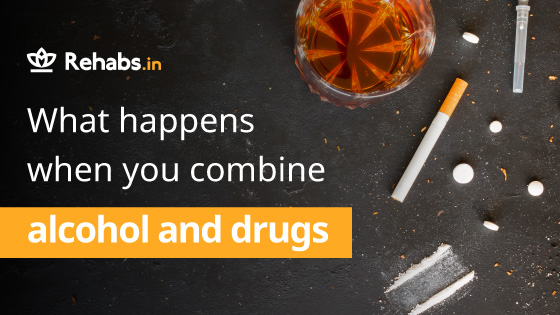What happens when you combine alcohol and drugs!

Have you ever accidentally spilled some drops of water on hot oil? The minute the cold water touches the hot oil it starts spluttering and exploding and if you don’t back away fast enough you could get burned by the hot oil splatter. Mixing alcohol and drugs is just like that, they don’t get along and combining them can be very dangerous.
When you mix alcohol with drugs – whether they are over-the-counter, prescription or recreational- you increase the risk of potential side effects, reduce the efficacy of the medicines and in a few cases face the danger of coma, overdose and even death. Abusing two or more drugs at the same time is known as polysubstance or polydrug abuse. Continuous polydrug abuse can lead to quick deterioration of physical health and mental wellbeing and can affect relationships – social, personal and work. There are quite a few who mix alcohol with drugs to either get a better high or to ease the comedown effects. However, there are few who may mix alcohol with drugs – especially prescription drugs – because they are not aware of the dangers. So, let’s go ahead and understand the dangers of mixing alcohol with drugs.
Dangers of mixing alcohol with recreational drugs
People who abuse alcohol may proactively mix it with other drugs to elicit a certain high or may do drugs under the influence of alcohol. Whatever may be the reason, the outcome is usually dangerous and often fatal.
Alcohol with cocaine: Cocaine causes one to be euphoric, energetic and mentally alert. People sometimes abuse alcohol and cocaine together to either increase these effects or to decrease the feeling of intoxication. However, mixing these two substances causes the liver to produce a toxic substance called cocaethylene, which is far more toxic than either alcohol or cocaine. It can cause arrhythmias and heart damage. Other potential side effects include:
· Heart palpitations
· Chest pain
· Stroke
· Seizures
· Confusion
· Impaired judgment
· Paranoia
· Anxiety
· Anger
· Nausea
· Vomiting
· Coma
Alcohol with Marijuana: Smoking or consuming marijuana or cannabis leads to either high and happy feelings or weird and distorted perceptions. The psychoactive effects are caused by Tetrahydrocannabinol (THC), an active ingredient in marijuana. When alcohol and marijuana are abused together, a higher concentration of active THC develops in the blood. This means that consuming even one drink in combination with marijuana/cannabis can lead to elevated levels of high. This is one of the most common forms of polydrug abuse. Some of the side effects of this combination include:
· Rapid heart rate
· Anxiety
· Impaired coordination and judgment
· Slurred speech
· Memory problems
· Dry mouth
· Bloodshot eyes
· Withdrawal from friends and family
· Distorted sense of time
· Lethargy
· Stupor
· Coma
Alcohol with Heroin: This illegal drug is usually injected or snorted and it slows down one’s heart rate and breathing. When it is abused with alcohol it can cause severe respiratory depression, leading to respiratory failure, overdose and death. This combination also impairs one’s gag reflex and if the person vomits while sleeping, then they can choke to death. Some of the common signs of alcohol and heroin abuse include:
· Mood swings
· Confusion
· Slowed thought and movement
· Attention problems
· Memory impairment
· Coordination issues
· Slurred speech
· Drowsiness
· Stupor
· Nausea and vomiting
· Constipation
· Heart rate changes
· Decreased respiratory rate
Dangers of mixing alcohol with prescription drugs
Many people don’t mix alcohol and prescription drugs knowingly. Some fail to read the label on the medicine or forget the doctor’s advice. However, there are a few who intentionally mix alcohol with prescription drugs to get a certain high or psychological response. Prescription painkillers, sedatives, antidepressants, and antipsychotics are the most frequently used drugs mixed with alcohol.
Alcohol with prescription opioids: Prescription opioids are strong pain-reducing medications or painkillers. They include oxycodone, hydrocodone, and morphine. The effects of this combination is the same as mixing alcohol and heroin because the chemical structure of opioids and heroin are quite similar. In fact, even a single tablet of opioid oxycodone with a small amount of alcohol can elevate the danger of respiratory depression. This can cause breathing to be extremely shallow or shut down altogether causing respiratory failure and even death. Combining alcohol and opioids can cause a number of side effects, including:
· respiratory depression and arrest
· unconsciousness
· cardiovascular risk
· irregular heart rate
· coma
· nausea and vomiting
· dehydration
· changes in blood pressure
· loss of coordination
· dizziness
· extreme lack of inhibition
· unusual behaviour
Alcohol with sedatives: Sedatives drugs include benzodiazepines and barbiturates. Commonly used benzodiazepines drugs are Xanax (alprazolam) and Valium (diazepam) and they are used to treat anxiety issues. Drugs that are used to help maintain or induce sleep include sedatives like Ambien (zolpidem), Flexeril (cyclobenzaprine), etc. Alcohol and sedatives both act as central nervous system (CNS) depressants, meaning they slow brain activity. When alcohol is mixed with sedatives these effects get stronger and cause the breathing to slow down to the extent that it stops completely. Other side effects can include the following:
· Mood swings
· Impaired judgment
· Confusion
· Lethargy
· Drowsiness
· Stupor
· Incoordination
· Memory impairment
· Distraction
· Slurred speech
https://www.alcohol.org/mixing-with/
Alcohol with Antidepressants/Antipsychotics and Alcohol: Antidepressants and antipsychotics are specifically developed to treat clinical depression and mental illnesses. Most antidepressants come under the category of medications known as selective serotonin reuptake inhibitors (SSRI), which regulate the brain’s serotonin levels. One of the common side effects of these medicines is increased drowsiness. When alcohol is mixed with an SSRI it can lead to a disorder called pathological intoxication. This disorder can lower one’s inhibition towards committing violent and sometimes forceful sexual acts. Even a small amount of alcohol with any of these drugs can lead to severe memory impairment. Mixing alcohol with antipsychotics like Thorazine and Abilify (drugs for treating symptoms of schizophrenia) can exacerbate the side effects and may lead to the following side effects:
· Severe respiratory depression
· Compromised motor functions
· Severe drowsiness
· Liver damage with chronic use
· Possible stroke or heart attack
Dangers of mixing alcohol with Over-the-Counter (OTC) drugs
Most people think that OTC drugs are safe to consume as they are easily available without a prescription. However, all drugs whether they are easily available or prescribed or illegal will have some or other adverse side effects. The effects of mixing OTC drugs with alcohol will differ depending on the ingredients in the OTC medications. However, there are three fundamental types of reaction to combining drugs and they are:
Duplication: Two drugs, or a drug and alcohol, that have similar effects will multiply each other’s effects.
Opposition: Alcohol may cause one result while an OTC drug can cause another. This can decrease the efficacy of the OTC drug, or it can injure certain body systems due to stress.
Alteration: Alcohol can change how the OTC drug is absorbed and processed by the body, or vice versa. This can alter the results of the medicine. Some of the harmful side effects of mixing alcohol and OTC drugs include:
· Nausea
· Vomiting
· Headaches
· Fainting spells
· Drowsiness
· Blood pressure fluctuations
· Lack of coordination
· Liver damage or failure
· Heart problems
· Impaired breathing, leading to oxygen deprivation
· Internal bleeding
· Depression or mental changes
Mixing alcohol and drugs can have severe consequences on your physical being and mental health. If you have to take medicines for a few days then make sure that on those days you don’t indulge in alcohol. If you know someone who has a polydrug disorder and is constantly abusing alcohol with drugs, then help them understand the dangers of it and get them the right de-addiction treatment. You can browse treatment centres in India here.
Sources:
Mixing alcohol with other drugs
https://www.nidirect.gov.uk/articles/mixing-alcohol-other-drugs
Crane. M., Meredith Watkins. M., Scot Thomas. S. (2021, Oct) Mixing Drugs and Alcohol.
https://projectknow.com/mixing-drugs/
Perez. A., Caitlin Geng. C. (2021, Dec) What to know about alcohol and opioid use.
https://www.medicalnewstoday.com/articles/alcohol-and-opioid-use#other-harmful-effects
Editorial staff. (2021, Sep) The Effects of Mixing Alcohol & Drugs
https://www.alcohol.org/mixing-with/
Editorial staff. (2021, Oct) The Effects of Mixing Alcohol and Over-the-Counter Drugs?
https://www.alcohol.org/mixing-with/over-the-counter/












